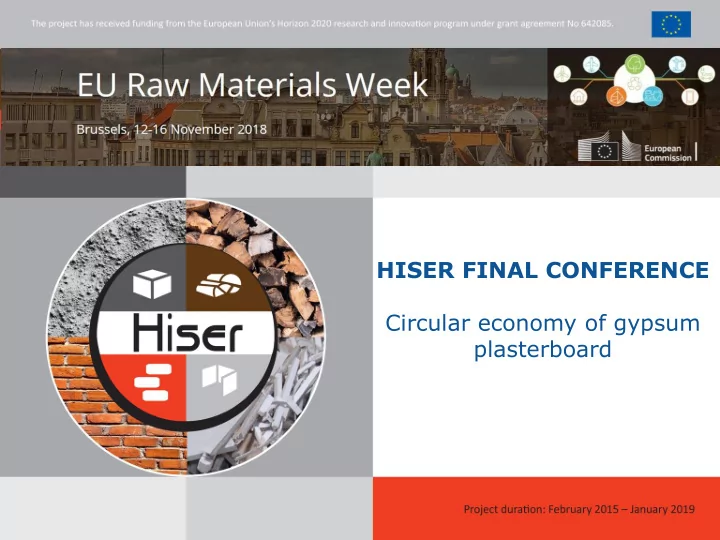

HISER FINAL CONFERENCE Circular economy of gypsum plasterboard
Plasterboard waste PRECONSUMER -> CLEAN, FAST AND EXCELLENT TRACEABILITY POST-CONSUMER -> DIRTY, NO TRACEABILITY
Major recycling scheme in EU
Review of separation techniques
Previous sorting
New recycling concept • To develop onsite recycling equipment: SMALL- MEDIUM BIG EQUIPMENT EQUIPMENTS • SCALABLE • HIGH CAPACITY • DELIVERED TO CONSTRUCTION SITES • COST: 1,5M € -2M € • HIGH RATE CAPACITY/CONSUMPTION • HIGH PURITY RATES
Developed recycling equipments • Power: 2,5 kW • Max Width: 50 cm • Roller feed system: 10 cm/s • Capacity: 180 m 2 /h max. • Recycling cap: max. 900 kg/h • Gypsum purity: >75% • Cardboard cardboard: 40%-65% NATIONAL PATENT MODEL OBTAINED Nr. 987/234897 EUROPEAN PATENT MODEL REQUESTED • Also for postconsumer waste • Power: 20 kW • Max Width: 150 cm • Double roller feed system: 25 cm/s • Capacity: 1350 m 2 /h max. • Recycling cap: 10.800 kg/h • Investment cost: 24.000 €
Purity v s grain size distribution TARGET: <8mm
Combined with sensor sorting NIR spectroscopy has been explored to detect inline and sort out improper materials contained in (crushed and sieved) postconsumer plasterboards streams collected separately in C&D works: Knauf‘s recycling system Recycled material: GYPSUM Active fraction: Passage fraction: ejected impurities plasterboards Recycled material: PAPER
New plasterboards with recycled gypsum INCREASES UP TO 10% OF RECYCLED GYPSUM DOES NOT SIGNIFICANTLY AFFECT STRENGTH NOR E-MODULUS. Recycling content during the manufacturing process affects the mixture and additives should be readjusted .
Manufacturing, installation and monitoring 1500x650x15mm 3000x3000x2400mm Installation of plasterboards (conventional and recycled) for interior walling Monitoring under real conditions: temperature, heat flow, power consumption, humidity.
ADR TECHNOLOGY B.V Project manager: David García TECNALIA Bizkaia Technology Park – Building 700 – 48160 (Spain) david.garcia@tecnalia.com
Recommend
More recommend